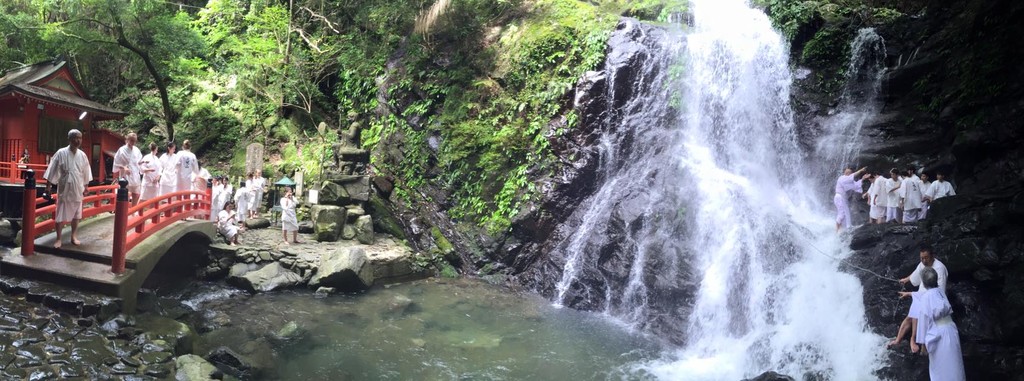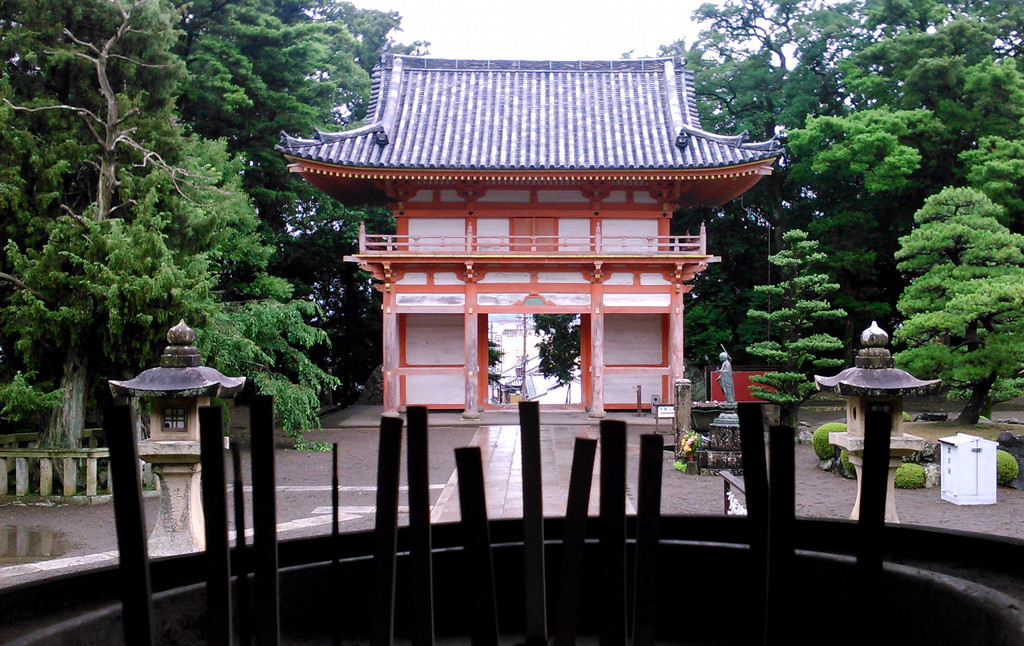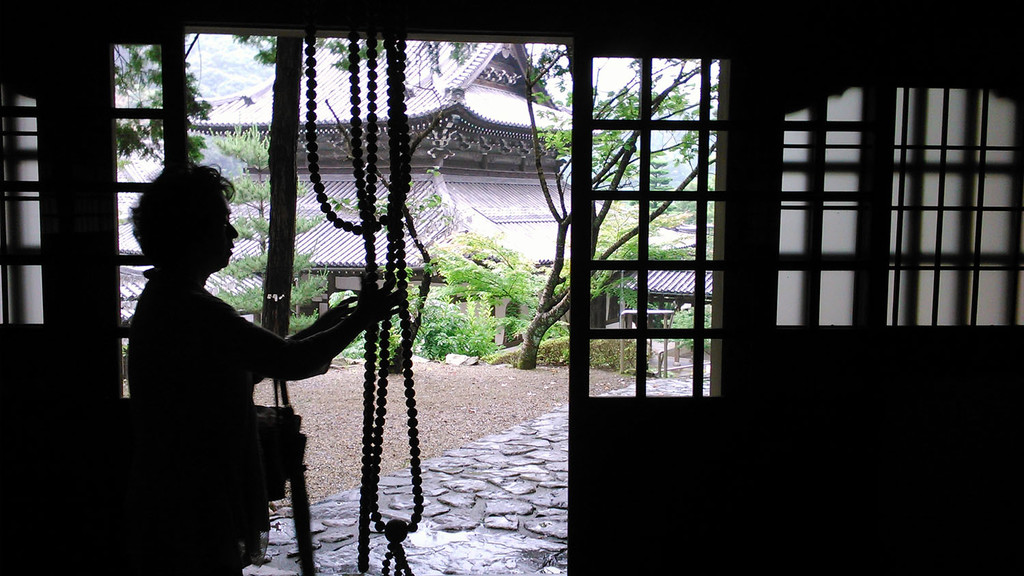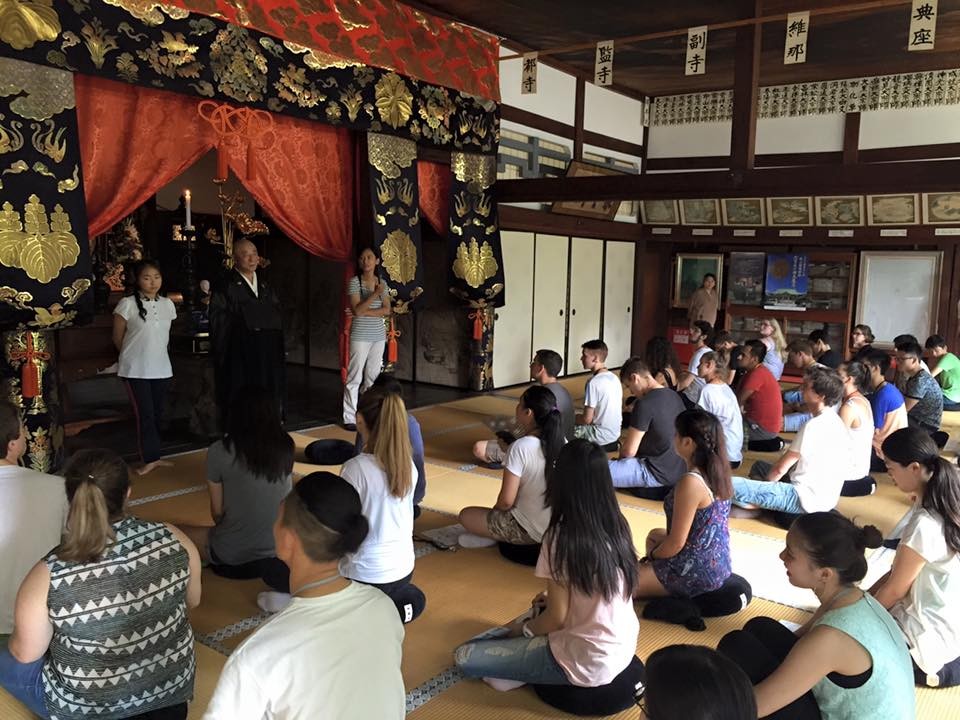My thoughts and impressions after a month in Japan | part 5
And the finale part is here! I would like to dedicate it and finish it with some impressions of what I experienced and learned about religions and philosophy in Japan, about the colors of Japan as if I had to pick some and with the life-style. If you missed them, you can read part 1, part 2, part 3 and part 4.
Let us begin (or end)!
15 Religions in Japan and the Japanese philosophy of life
I will try to bring you forth some things I was told by the monk from Dōjōji temple (those who have met him or heard of him already, yes, it's Mr Ono! ). The Japanese religion or actually philosophy of life (since they have no gods) and everything surrounding us is a mixture of Buddhism and Shintoism plus Confucianism and Hinduism. As he says, they tried to take the best from every of these. Otherwise, Buddhism has had the biggest influence on the Japanese mentality. Buddhism came to Japan from China. The second one is Shinto(ism) which is the local Japanese kind of a religion. There are over 78 thousand Buddhist temples all over Japan.
Visiting many temples and sanctuaries
During my stay there I visited several temples and sanctuaries. Dōjōji is in the town of Gobo, Kokoku-ji also relatively close to it in the same prefecture, Miyajima sanctuary is near Hiroshima, Inunakiyama Onsen relatively close to Osaka, there was also a temple in Osaka itself where we had an opportunity to practice Zazen meditation, and the last are Koyosan and temples Okunoin and Kongobuji.
Dōjōji, Kokoku-ji and Miyajima are my favorite though. Especially Dōjōji which I had the opportunity to visit several times and lived few minutes away from it, but nothing without the good guidance and patient of Mr Ono (who was also #1 in our camp). You will find out more about these places in my special articles later.
The ritual under the waterfall

Except for Zazen meditation we had the opportunity as well to be present or better - participate in one 'ritual' at Inunakiyama Onsen. To reach the place we had to climb up a bit the mountain following the stone roads and pass through the iconic orange-reddish portals. When reached the house where our guide (and kind of a priest some would say) was waiting for us we had to change our clothes. All of us, girls and boys, were given white dresses and we changed the clothes separately. The boys went under the house next to the brook. Again no time for feeling embarrassed or uncomfortable being naked for a few seconds (and I guess non had such problems now after showering the very same morning).
We went over a little red bridge to the other side of the rocks and stayed in a line next to the small waterfall. The boys were again the first. I heard some people jumping in the air after touching the water. I put my toe in it to see what it feels like. It felt ice cold. Great! And the first group of 6 boy went to climb up the rocks about 2 and half meters up where the priest was waiting for them. To help you get up you held yourself for the chain. Then it started! You had to go beneath the icy waterfall that was hitting your back and made you think you were wearing a diving suit and not a dress. Then the priest would start shouting something in the Japanese while the group was holding the chains.
Now my turn came and I climbed up the waterfall with few of us more. I was scared of two things. First, that I don't fall down and hit with my body the rocks and look like an idiot (happened to one friend). The second was... well... pretty obvious. Since we had nothing beneath our dress that would hide our 'pride' and other parts I hoped that I don't fall down revealing or just reveal accidentally something on my way up the chain. Because the rest of the camp was down behind me haha. Or that some parts become visible or noticeable once the dress became totally wet under the waterfall. Luckily, non of these things had happened. At first it was freaking cold and I preyed inside that I do not have to go to pee. But then after going under the waterfall after a minute you get used to it and at the very end after 3-4 minutes under the water you feel much comfortable. There were no problems as well when going down. All in all, the feeling was awesome and I think my friends from the camp would also agree that it was one of the best and unique experiences we had. How many times in your life do you go to the mountains in Japan and 'get cleaned' under the waterfall during the traditional custom? Exactly.
How to behave when visiting temples?

During my visit to the first two temples (Dōjōji andKokoku-ji) with my host family I had a chance to learn some 'basics' how to behave, to do the proper steps... huh, I do not even know in Croatian how to call this. Simply what a visitor does when visiting such places. So there we go.
You bow twice at the entrance just before passing the portal. Generally, as far as I noticed, there is a well where you take a a little bucket on a stick. You take it with your right hand and wash first left hand. Then the opposite. Afterwards you go to the temple (or climb up the stairs) where you will see the statue of Buddha, Kannon or some other persons or figures. There you should bow as well. In front of the temple you can find a giant bowl or a jar filled with ashes and several sticks in it. Now you take one of the sticks and enkindle it. Then extinguish the fire but just so the smoke is left. Stick it back into the ashes and try to grasp a bit of the smoke with your hands and symbolically cover your hair and around the head with it. Thus we are symbolically 'cleaning' ourselves (I guess). Some places have also ropes with a bell which you drag to produce the sound and then bow to the present figures. Next to all of them there is a box where you can throw in some coins before enkindling the sticks or dragging the rope. I was very happy when my first host mom showed me the steps when visiting the first two temples as later in the camp I already knew what to do. I hope I did not forget to mention something important. Or said something that makes no sense or was wrong. But I think this can help you if you are ever planning to visit some of the temples there. It is a very unique experience and feels great when you try to be part of the society (try to immerse and feel as the Japanese do)... I always vote for that, not just to stand like stupid tourists aside and watch what the others do.

There was also some temple I visited with my fourth host family in Gobo but more about it in my diary later.
A few words about Buddhism
Listening to the stories about Japanese history, culture, religion and philosophy was of special interest to me. Especially since I had been given the privilege to see all the corners of the temple and statues with my own eyes and document them with my camera. Once I got home I did more research on these topics to get answers on some questions and understand more the society there. Many friends also asked me about this so I wanted to give a bit of an overview or some sort of explanation. Here is what I learned.
When talking about Buddhism the concept is rather simpler maybe than when it is the case with Christianity and also might help you understand more the mentality of Eastern Asia (and what you have read so far here). Buddhism is based on the belief that in each of us there is born Buddha. Who is Buddha? Or what does it mean here 'Buddha'?. Literally means 'the enlightened, awaken'. But the interesting thing is that in Buddhism there is no Supreme Deity (as we have it) but rather the individual is in the center. This was among the first things I learned about at Dojoji. The point is that during our lifetime a man tries to reach the highest goal or rather condition - to become Buddha, to be honorable, fair and nice the most towards him or herself. And when a person is nice to itself then it is also nice to others. Everyone should avoid greed, jealousy and hate towards the other people. Buddhism is as you can see not a religion in a sense we use that word, it is not even a system of believes or showing respect to some divine being, there is no this Supreme Being or God. Buddhism is simply based on looking to the truth, on rebuilding ourselves to reach the highest level of goodness and prosperity. As they said - Buddha can show us the path but not walk with us on it. The similar is with the (heh) deity of mercy and of thousands of hands - Kannon. I was mostly under impression of this figure, his statue and the stories behind him. He is very popular in Asia and Japan and he holds 'help' in every hand... except for one which is empty symbolizing that we have to solve the biggest problems ourselves. I like the principle because when compared to Croatia (which is pretty religious, Roman Catholics...not going to comment much huh... ) where the very religious part of population expects all the solutions to come from God/Supreme Being.
In addition to this, the Buddhists do not believe in our system of immortal souls but have their own so called Wheel of life which means they believe in the reincarnation or rebirth. The current life we have is apparently heavily influenced by our actions and deeds from the previous life. It is of course important to mention here karma which literally means 'action, virtue ' and it refers to the Buddhist view on the world as a result or consequence of many effects. All of our activities and what we do has consequences on the life in future. Every action produces both cause and reaction. Karma is we could say a law between "action and reaction". Good deeds and intentions will have a positive effects on future and luck whereas the bad deeds and intentions will have a negative consequences and maybe suffering. The past affects the presents but does not dominate. Everyone has a choice whether they will act good or bad. Karma is not a fate or destiny nor does it suggest some blind determinism. By practicing good karma we are getting closer to Nirvana which is a state or condition of goodness and prosperity.
And a bit on Zazen

Because why not? Zen is a popular term but here is what is hiding behind it. The concept is a bit abstract and might be difficult to explain or understand.. but let me simplify it. It is a state of a clear mind, when we do not think of anything, we do not ask any questions, we do not try to push away our thoughts by force or try to run away from them. The point is that you try to be you, not something else. Sounds confusing? And it was when we listened to it for the first time haha. The goal is not to fall into a sate of thinking or just buzzing (looking into one spot and being lost) but let Zen fill you, that the state of Zen prevails.
One period of Zazen lasts for around 40 minutes. Then there are more phases. But it is complicated to explain so search on the internet if you are curious to know more. I can tell you that the most 'appropriate' posture while sitting is almost impossible to obtain. I couldn't do it without feeling my legs were going to break. Luckily, there is a solution that you put only one leg over another. Normally it's both over each other (how?! ). More about Zazen (as you see on the photograph above) in my daily dairy.
16 The colours of Japan
Now this is my personal experience of Japan and how I would visualize Japan by using some colours. Or which colours should represent Japan according to what I had seen there? The colours that dominate are the green - representing forests and mountains, the red - representing the temples and sanctuaries, the black and gray - referring to the roofs of the houses, temple, the streets and the cloudy sky, the blue - for the rivers and ocean. The white is like an addition to the cars and school uniforms.
17 Lifestyle
During the summer the Japanese prefer to spend their time at home. I have not met many people in the streets but maybe because it was very hot and humid so it was only me waddling around the town. The thing is, at home they have more than one air conditioner and they like to drink lots of tea but also coffee and beer. However, if there are festivals in the cities, they will all start to go out. Bicycles are one of the favorite means of transport, especially in smaller places. They often ride old bikes and 'ponies'. Thus there is no chasing in the streets. Sometimes it all seemed to be a bit slow or slowed down... but the life there is moving at this specific pace, it's not fast nor slow, just somewhere there. They are not in a hurry, yet again they start and finish everything in time. Some go to sleep earlier but I noticed that everyone wakes up early. In Summer it might be the case that because of hot temperatures many try to do the housework or work on their fields or in the gardens early in the morning. I have also noticed that in the rooms it is almost impossible to darken the room completely with curtains and protect yourself from the sunrise in the morning. Thus I had many times problems with waking up around 6-7h and then did not know what to do, couldn't sleep as it was hot again and didn't want to sleep with my air conditioner turned on. If you go to sleep earlier, before midnight, then it is not such a big deal but the heat and the feel like you are on the steamboat makes it hard. They like to take shower and wash their clothes every day. TV is turned on, many watch bizzare things and not rarely it is a baseball match (or they thought I like it so they left it on the screen).
Karaoke!
And the very last are karaoke and karaoke bars which are very very popular in Japan. It should not surprise you since it was the Japanese who invented it! Every little town or place has a few karaoke bars which are visited by the teenagers, adults and also seniors. I had the opportunity to visit two karaoke bars when luckily there were not many people (or it was my companions) and once at one hotel in the camp. It is very much fun when you sing in pair, but when you hear your own voice I wanted to stick their chopsticks into my head. They have lots of foreign music, not literally everything but you can find something. While singing the opening theme of Dragonball with the seniors I had to have the lyrics on my mobile phone in Latin script as I couldn't follow in Japanese. The old Japanese like to sing mostly some old love songs. The youth... no idea actually! There were some Japanese 25-35 but they sang in Japanese things I never heard before and don't remember much. Anyway, going to a karaoke bar is a must-see (try) if you are planning to go to Japan!
Of course, I cannot compare much city like Osaka with several million population and a small town of Gobo with 25 thousand citizens who mostly look forward to the simple life without much stress and where the things such as crazy festivals and other events do not take place there. Yet there are some universal values, the mentality to work and improve yourself in whatever field you are, following the rules and values of the society (and maybe obeying the hierarchy). I forgot to mention that lots of young Japanese also train some of the martial arts so judo or karate and the others are quiet popular.
All right, that is it. If someone has any more comments, questions or wants to complain about something, please share it with me. I hope this articles helped you to learn something new about Japan and of course that it was interesting to read.
Now going to describe my month there which means you're going to read texts on HIroshima, Osaka and its famous Tenjin Matsuri, visiting Universal Studios Japan, special temples and what do they hide, working at the restaurant, fun with samurais and much more!
Arigatou gozaimashita.
Gurego-san
Photo gallery
Content available in other languages
Want to have your own Erasmus blog?
If you are experiencing living abroad, you're an avid traveller or want to promote the city where you live... create your own blog and share your adventures!
I want to create my Erasmus blog! →







Comments (0 comments)